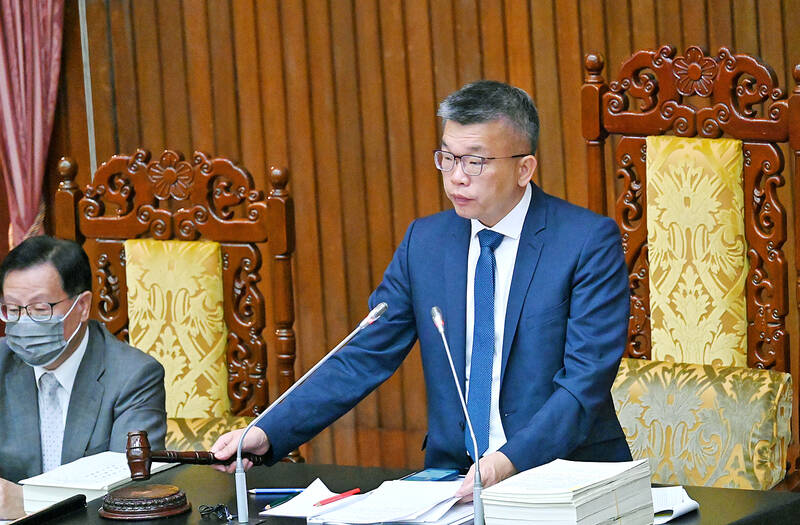Legislators yesterday passed an amendment that would require some newly built, expanded or altered structures to install rooftop solar panels.
The amendment was one of several revisions to the Renewable Energy Development Act (再生能源發展條例) that were approved after being proposed by the Cabinet and sent to the Legislative Yuan in December last year to increase renewable energy sources.
New buildings that meet a size threshold would be required to design and install a specified capacity of solar panels on the building, the amendments say.

Photo: Chu Pei-hsiung, Taipei Time
The building owners would be allowed to use the electricity generated or could sell it to state-run utility Taiwan Power Co or private entities, as stipulated by existing provisions in the act.
The amendments were reviewed along with other proposals by legislators, but the revisions passed were based on the versions proposed by the Cabinet.
The Ministry of the Interior, which oversees the construction industry, and the Ministry of Economic Affairs would finalize the details of the solar panel amendment, such as the size threshold for new buildings and the type of buildings included.
The minimum required solar power installation capacity in the revision would also be finalized, while standards for exposure to the sun and the date the revision is to take effect also need to be decided.
Other areas covered by the amendments were provisions related to offshore wind power, hydropower and geothermal energy sources.
As technological advancements have overcome obstacles such as deep water, the amendment related to offshore wind removes a provision that says offshore wind installations could “not go beyond territorial waters” to expand the range of deployment.
Another revision allows water storage facilities to be used for hydropower generation, and another defined the overseeing authority and application procedures for surveying geothermal power sources.

Alain Robert, known as the "French Spider-Man," praised Alex Honnold as exceptionally well-prepared after the US climber completed a free solo ascent of Taipei 101 yesterday. Robert said Honnold's ascent of the 508m-tall skyscraper in just more than one-and-a-half hours without using safety ropes or equipment was a remarkable achievement. "This is my life," he said in an interview conducted in French, adding that he liked the feeling of being "on the edge of danger." The 63-year-old Frenchman climbed Taipei 101 using ropes in December 2004, taking about four hours to reach the top. On a one-to-10 scale of difficulty, Robert said Taipei 101

A preclearance service to facilitate entry for people traveling to select airports in Japan would be available from Thursday next week to Feb. 25 at Taiwan Taoyuan International Airport, Taoyuan International Airport Corp (TIAC) said on Tuesday. The service was first made available to Taiwanese travelers throughout the winter vacation of 2024 and during the Lunar New Year holiday. In addition to flights to the Japanese cities of Hakodate, Asahikawa, Akita, Sendai, Niigata, Okayama, Takamatsu, Kumamoto and Kagoshima, the service would be available to travelers to Kobe and Oita. The service can be accessed by passengers of 15 flight routes operated by

Taiwanese and US defense groups are collaborating to introduce deployable, semi-autonomous manufacturing systems for drones and components in a boost to the nation’s supply chain resilience. Taiwan’s G-Tech Optroelectronics Corp subsidiary GTOC and the US’ Aerkomm Inc on Friday announced an agreement with fellow US-based Firestorm Lab to adopt the latter’s xCell, a technology featuring 3D printers fitted in 6.1m container units. The systems enable aerial platforms and parts to be produced in high volumes from dispersed nodes capable of rapid redeployment, to minimize the risk of enemy strikes and to meet field requirements, they said. Firestorm chief technology officer Ian Muceus said

MORE FALL: An investigation into one of Xi’s key cronies, part of a broader ‘anti-corruption’ drive, indicates that he might have a deep distrust in the military, an expert said China’s latest military purge underscores systemic risks in its shift from collective leadership to sole rule under Chinese President Xi Jinping (習近平), and could disrupt its chain of command and military capabilities, a national security official said yesterday. If decisionmaking within the Chinese Communist Party has become “irrational” under one-man rule, the Taiwan Strait and the regional situation must be approached with extreme caution, given unforeseen risks, they added. The anonymous official made the remarks as China’s Central Military Commission Vice Chairman Zhang Youxia (張又俠) and Joint Staff Department Chief of Staff Liu Zhenli (劉振立) were reportedly being investigated for suspected “serious